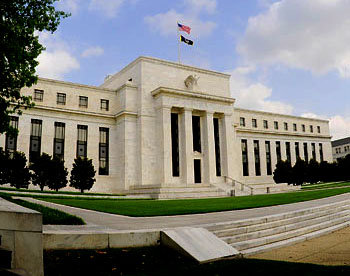Bruce Bartlett says today that plummeting housing prices are responsible for a big decrease in consumer spending, something that can be visualized by looking at the velocity of money — i.e.,  the speed at which money gets turned over from person to person instead of being stashed away. When velocity goes down, it’s roughly the same as the money supply going down. This presents us with a grim picture:
the speed at which money gets turned over from person to person instead of being stashed away. When velocity goes down, it’s roughly the same as the money supply going down. This presents us with a grim picture:
Since 2006, money supply has increased by about $2 trillion. But velocity fell faster than the money supply increased as households reduced spending and increased saving — the saving rate is now over 5 percent — and banks and businesses hoarded cash.
….Fiscal policy could raise velocity and growth by getting money moving throughout the economy. But since that is not feasible, the Fed is the only game in town. Joseph Gagnon, a former Fed economist, says that it should immediately increase the money supply by $2 trillion and promise to keep increasing it until the economy has turned around.
But the Fed is already under pressure to tighten monetary policy from its regional bank presidents, three of whom dissented from last week’s Fed decision to keep policy steady. They fear that inflation is right around the corner. But as the Harvard economist Kenneth Rogoff has argued, a short burst of inflation would do more to fix the economy’s problems than any other thing. One reason is that inflation raises spending by encouraging consumers and businesses to buy things they need immediately because prices will be higher in the future.
Contrary to current Republican dogma, the Fed should be printing gobs and gobs of money. There’s little reason to think this would have any long-term effect on inflation, and igniting the economy would have a much greater impact on reducing future deficits than whatever flimsy deal our congressional supercommittee comes up with later this year.
Of course, as Rick Perry accidentally pointed out yesterday, printing gobs of money would ignite the economy right now, which is about a year too early for Republican tastes. Sometime after the election would be their preference.













